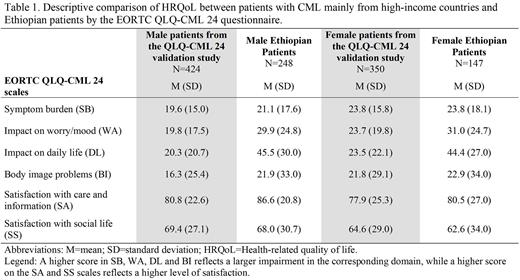Abstract
Background Assessment of health-related quality of life (HRQoL) of patients with chronic myeloid leukemia (CML) treated with modern tyrosine kinase inhibitors (TKIs) is critical to support informed decision-making. However, HRQoL data currently available mainly stems from patients enrolled in high-income countries. Little is known about HRQoL of patients with CML living in low-income African countries and on the potential impact of financial difficulties experienced by these patients.
Purpose The main objective of this study was to examine prevalence of clinically relevant problems and symptoms of Ethiopian patients with CML. A secondary objective was to investigate the impact of financial burden on HRQoL profile of these patients.
Methods This was an observational cross-sectional study conducted at Tikur Anbessa Hospital (Addis Ababa), which is the only Ethiopian center providing TKI therapy to CML patients from all over the country. Adult patients (at least 18 years old) with a confirmed diagnosis of CML were eligible for this study. At study entry, HRQoL was assessed with the EORTC QLQ-C30 and the QLQ-CML24 questionnaires. Prevalence of clinically important problems and symptoms, at the patient level, was examined using established criteria for the use of the EORTC QLQ-C30 in routine clinical practice. This prevalence reflects the number of patients indicating limitations of everyday life, worrying, or need for help or care related to a specific symptom or functional impairment (Giesinger JM. J Clin Epidemiol. 2020;118:1-8). For descriptive purposes, EORTC QLQ-CML24 scores of Ethiopian patients were compared to that of patients included in the validation study of this questionnaire, who were mainly enrolled from high-income countries (Efficace F, et al Leuk Lymphoma. 2021;62:669-678). Multivariable linear regression analysis was performed to examine the association between financial difficulty (EORTC QLQ-C30) on "impact on daily life" scale (EORTC QLQ-CML24) while controlling for key potential observed confounding factors. The study was approved from ethical committee of the institution and all patients provided informed consent.
Results Between February 2021 and June 2021, 395 patients were consecutively enrolled. Median age of patients was 39 years (range 18-82) and there were 62.8%, and 37.2% of males and females' patients respectively. Median time since diagnosis was 3.9 years (range 0.2-16) and 94% were diagnosed in chronic phase (CP) of the disease. The majority of patients (92.7%) were in treatment with imatinib and, overall, 82.3% were in complete hematologic response but unknown molecular remission status. The majority of patients (82.8%) were not able to afford follow-up BCR-ABL tests to monitor molecular response.
The top three most prevalent clinically important problems were found for physical functioning (60%), emotional functioning (40%) and social functioning (38%). Pain was the most prevalent clinically important symptom reported by 43% of patients. Notably, 89% of patients reported relevant financial difficulties. Mean EORTC QLQ-C30 global health status/QoL score of patients with higher financial difficulties was 14 points lower (worse) than those with lower financial difficulties (P<0.001). Gender specific descriptive comparison of Ethiopian patients with CML patients mainly from high-income countries, revealed worse mean scores in key domains of the EORTC QLQ-CML24. For example, male Ethiopian patients reported a higher (worse) mean score (+25.2 points) than male patients from high-income countries (Table 1). In the multivariable analysis, higher financial difficulty, was associated (P<.001) with a greater impact on daily life (EORTC QLQ-CML24) and this was independent of other key variables including: age, sex, time since diagnosis, comorbidity, distance to hospital as well as fatigue and symptom burden.
Conclusions Financial burden is a major problem affecting a large proportion of Ethiopian patients with CML receiving TKIs. Our findings also suggest that financial difficulties of these patients are also associated with worse HRQoL outcomes. Future studies are needed to assess whether efforts to reduce financial burden in these patients could improve HRQoL and facilitate adherence to therapy, thereby maximizing TKIs efficacy.
Disclosures
Efficace:Novartis: Consultancy, Research Funding; Janssen: Consultancy; Amgen: Research Funding; Abbvie: Consultancy, Research Funding.
Author notes
Asterisk with author names denotes non-ASH members.


This feature is available to Subscribers Only
Sign In or Create an Account Close Modal